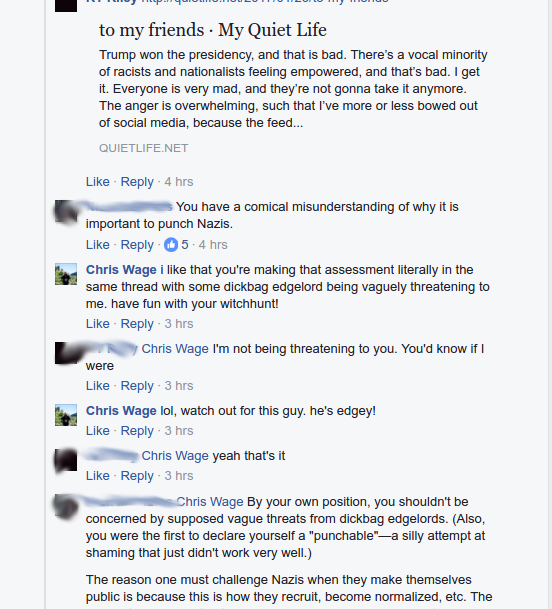23 Jun 2017
I see that healthcare reform is in the news again! How exciting.
A few months ago I joked that there were two articles that were required reading before I discussed healthcare in the united states with anyone. I thought I’d flesh that out a little bit:
- A good succinct no-frills timeline of how we got here. Do we have a government system? A private system? Why is the responsibility for healthcare placed on employers? Why is it called insurance when it covers not-unexpected things? If you don’t know the answer to any of these questions, read this.
- This recent econtalk episode is a good, lengthier discussion of the above process. Christy Ford Chapin’s book is worth reading as well.
- This summary of medical pricing and the AMA helps explain where and how costs are set in our current system. “Why is our healthcare so expensive?” is a difficult question, but this is one glaring part of the answer. (tl;dr: it’s a profiteering racket)
- If you’ll allow some self-indulgence, this post by me, opining on obamacare (my optimism has since greatly diminished in the intervening 7 years), but in particular pointing out the difference between “health care” and “health insurance”, and lamenting the fact that in public debate, no one even bothers to make this lexical distinction.
- Buy Health, Not Healthcare - a good framing of the situation by Robin Hanson in 1994.
- A good thorough analysis of healthcare costs and the ramifications of various single-payer proposals by Megan McArdle.
- Econtalk’s fascinating episode with Kevin Smith on the Surgery Center of Oklahoma and how most of the industry currently bills for procedures. (You might need to sit down for this one, parts of it are maddening).
27 Feb 2017
The scene: The Metro Nashville Commission to investigate forming a committee to plan to address the mysterious problem of expensive housing plaguing the growing city.
Expert: We’re gathered here today to address the problem of expensive housing that we just noticed again. Does anyone have any thoughts?
Expert #2: It’s really bad. Growth is bad.
Expert #3: Yeah, terrible, really bad – especially for poor people.
Voice from the back of the room: It’s because zoning/building regulations restrict supply, home purchase subsidies drive up demand, and property tax disincentivizes long-term ownership for low/middle-income families, driving up rent and effectively transferring wealth to the wealthy.
Expert: It’s a mystery, for sure.. it’s really bad – does anyone have any ideas?
Voice from the back of the room: uh, I just said it’s bec–
Expert #2: We need more affordable housing
Expert #3: Yes!! Affordable housing, that’s good – if people can afford housing, it’s cheaper.
Expert: Okay, but how?? strokes forehead
Voice from the back of the room: Hello? Is this thing on? encourage building and eliminate property ta–
Expert #2: This problem is really bad
Expert #3: Developers are evil.
Expert #2: YES! ugh, developers.
Expert #3: What if we made it illegal for housing to be unaffordable..
Voice from the back of the room: da fu–
Expert: hm, good point, good idea.. what if we made some regulations forcing developers to make housing affordable?
Expert #3: ooh, i like that, then the housing will be affordable, and we will punish developers
Voice from the back of the room: why not just let them build mo–
Expert #2: Perhaps a rule that developers have to sell housing slightly cheaper for the upper middle class for a miniscule amount of time before things go back to normal.
Expert: Perfect! Then we can say we’ve Done Something!
Expert #3: as long as they don’t build too much, though – otherwise the evil developers will profit
Expert #2: yes, definitely don’t want too much building
Expert: yes, growth is bad..
Sound of a head banging on wall in the back of the room
Expert: say .. can we claim this solves homelessness too?
25 Feb 2017
I’ve always been a big fan of Umberto Eco’s writing, and at a fairly young age I came across his essay “Eternal Fascism: Fourteen Ways of Looking at a Blackshirt”. Even then what I liked about it was the attempt to describe a broader pattern for a specific historical phenomenon. I’ve seen it used (by myself, included) as a checklist I could use to trump people lobbing accusations of Fascism. “That’s not fascism, this is fascism!”
But it’s wrong, I think, to treat it (or anything else, really) as some sort of canonically useful bad-guy-identification template. Eco was trying to describe a broader Ur-Fascism and he came close, but he was too close to the specific Fascism of his time, and his essay reflects that in some anachronistically specific characterizations of a broader phenomenon. I won’t go into specifics, because i think it’s fairly obvious, but it does highlight the current lexical problem we face.
The phenomenon he was perhaps trying to describe (Ur-Fascism) still doesn’t really have a good name, but let’s just describe it roughly as: the populist empowerment of a profiteering class of murderous (inter)national warlords. “Shitheads”, if you will. His essay contains many things that are probably pretty close to a broader indicator that things are headed this way. Others, though, are too specific to fascism as it emerged in the 20th century from right-nationalism in ways that isolate it as distinct form the leftism of the time. In the last ~100 years, though, things have changed. The relatively liberal democratic republics have joined with socialist communality into something new, different, and markedly less liberal: the modern “democratic socialist something something” nation state that we’d recognize today. “Corporatism”, in particular, is no longer a uniquely “fascist” phenomenon, but is rather the norm, with corporations as we know them being entrenched government-sanctioned entities. The world has moved far beyond the time of fascists vs. commies vs. anarchists vs socialists, but nonetheless we still frame things in these terms. That people still refer to “corporatism” as an indicator of nascent fascism instead of a fundamental element of the status quo goes to show how disconnected modern rhetoric is.
“Fascism”, in particular, still gets thrown around a lot as a sortof catch-all epithet, with varying degrees of nuance/understanding as to what that actually means. In many circles, it amounts to something as broad as “controlling, violent dickhead”, a characterization that would include Stalin as easily as it would Mussolini. Nonetheless, because of the historical association of 20th century fascism with right-nationalism, today’s left seems to see themselves as immune to (or worse, the antidote to) the phenomenon of fascism. But the manipulation of human failings that led to the rise of historical monsters are not unique to the right or the left.
As long as we let ourselves be useful idiots whipped up into violent frenzies along anachronistic (or modern!) ideological lines, there will be new “fascists” that emerge. But they won’t look like Hitler, or Mussolini. They may not even look like Donald Trump or Hillary Clinton – the growth of the modern nation-state is such that a strongly charismatic figurehead may not even be necessary to unleash the next wave of genocidal terror on the world. (For that matter, the mass harm inflicted on the world’s human population may not even resemble the overt violence of the past, either.)
I am not sure if we need a new word for what we used to call “fascism” or not. My friend rev suggested the more on-the-nose “totalitarian gleichschaltung”, but it doesn’t quite have the same ring to it.
Maybe what we call it doesn’t matter as long as we recognize it, but I believe (as Eco did) that words matter, and when I see people advocating mob violence in the name of “anti-fascism”, it’s a sign that we have a real problem of lexical confusion on our hands!
27 Jan 2017

“Things are going to start happening to me now!”
So, I got doxxed! FINALLY! I’ve been on this internet of ours 20 some years now. I’ve had racists threaten to dismember me at concerts, local stalkers repeatedly threaten castration/murder, etc. But no one has ever actually bothered to threaten me by pointing out they know where I live (not that it’s hard to find) – until now! Last night, I received two anonymous email messages with my (old, and redacted to protect the current occupant) address and “see you soon”.
The last straw that finally got me doxxed after 20 years on the internet? Apparently, it’s making the case that unprovoked violence is bad.
I encountered a facebook thread on an acquaintance’s post targetting the location of Richard Spencer and advocating violence, the comment thread of which was full of similar pleasantries – jokes about curbstomping being the most charming. So I chimed in, saying that this behaviour is disgusting. Someone disagreed (as is their right!), and labelled me a nazi sympathizer, shared my blogpost and, apparently, elicited said doxxing.
And so! I would like to go on record as saying that, in addition to unprovoked violence being bad, I also think doxxing people that think unprovoked violence is bad is also bad.
I would also like to make yet another appeal to my friends and anyone else out there hopping on the punching-suspected-nazis-is-good bandwagon, whether out of a misguided sense of historical ennui or just a bit of machismo chestpuffing: please pull your head out of your ass.
For the curious, details below (and no, I’m not worried about the seriousness of this threat – very likely adolescent edgelordery, much like all of this).
First email:
Return-Path: <[email protected]>
X-Spam-Checker-Version: SpamAssassin 3.4.0 (2014-02-07) on felix.quietlife.net
X-Spam-Level:
X-Spam-Status: No, score=0.8 required=5.0 tests=BAYES_50,FREEMAIL_FROM,
RCVD_IN_DNSWL_NONE,SPF_PASS autolearn=ham autolearn_force=no version=3.4.0
X-Original-To: [email protected]
Delivered-To: [email protected]
Received: from outbound004.roc2.bluetie.com (outbound004.roc2.bluetie.com [208.89.132.144])
(using TLSv1 with cipher DHE-RSA-AES128-SHA (128/128 bits))
(No client certificate requested)
by felix.quietlife.net (Postfix) with ESMTPS id 3BDF3255B0
for <[email protected]>; Thu, 26 Jan 2017 20:35:42 -0600 (CST)
Received: from web002.roc2.bluetie.com ([10.200.2.96])
by outbound004.roc2.bluetie.com with outbound004
id dEbX1u00224HP3e01EbXsB; Thu, 26 Jan 2017 21:35:31 -0500
X-CMAE-OUT-Analysis: v=2.1 cv=FfG5xfO6 c=1 sm=1 tr=0
a=41l5LDBFByitqw60Fh41mg==:117 a=L9H7d07YOLsA:10 a=9cW_t1CCXrUA:10
a=s5jvgZ67dGcA:10 a=IkcTkHD0fZMA:10 a=iCAEJT2w3HgA:10 a=IgFoBzBjUZAA:10
a=7fpVheC-bwZQUd9K_80A:9 a=QEXdDO2ut3YA:10
X-CMAE-OUT-Score: 0.00
X-BT-OutboundSpamChecked: true
Received: from web002.roc2.bluetie.com (localhost.localdomain [127.0.0.1])
by web002.roc2.bluetie.com (Postfix) with ESMTP id A6C253F0139
for <[email protected]>; Thu, 26 Jan 2017 21:35:31 -0500 (EST)
Message-ID: <[email protected]>
X-HTTP-Received: from Authenticated sender: bashfash.excite [62.210.129.246] by web002.roc2.bluetie.com (BlueTie WebMail); Thu, 26 Jan 2017 21:35:31 -0500
X-Mailer: BlueTie MTA
Date: Thu, 26 Jan 2017 21:35:31 -0500
Cc:
To: [email protected]
From: Full Name <[email protected]>
Importance: normal
Subject: [REDACTED ADDRESS]
Content-transfer-encoding: quoted-printable
Content-Type: text/plain; charset=UTF-8
see you soon
Second email:
Return-Path: <[email protected]>
X-Spam-Checker-Version: SpamAssassin 3.4.0 (2014-02-07) on felix.quietlife.net
X-Spam-Level:
X-Spam-Status: No, score=-0.6 required=5.0 tests=BAYES_20,RCVD_IN_DNSWL_NONE,
RP_MATCHES_RCVD,SPF_HELO_PASS,SPF_PASS autolearn=ham autolearn_force=no
version=3.4.0
X-Original-To: [email protected]
Delivered-To: [email protected]
Received: from remailer.paranoici.org (remailer.paranoici.org [88.80.28.20])
(using TLSv1.2 with cipher AECDH-AES256-SHA (256/256 bits))
(No client certificate requested)
by felix.quietlife.net (Postfix) with ESMTPS id 77C72255B0
for <[email protected]>; Thu, 26 Jan 2017 22:01:02 -0600 (CST)
Received: by remailer.paranoici.org (Postfix, from userid 1001)
id BE1EB100B56A; Fri, 27 Jan 2017 04:00:57 +0000 (UTC)
From: Anonymous <[email protected]>
Comments: This message did not originate from the Sender address above.
It was remailed automatically by anonymizing remailer software.
Please report problems or inappropriate use to the
remailer administrator at <[email protected]>.
To: [email protected]
Subject: [REDACTED ADDRESS]
Message-ID: <[email protected]>
Date: Fri, 27 Jan 2017 04:00:57 +0000 (UTC)
see you soon
The facebook thread in question:









23 Jan 2017
To my liberal/progressive/democrat/etc friends:
Trump won the presidency, and that is bad. There’s a vocal minority of racists and nationalists feeling empowered, and that’s bad. I get it. Everyone is very mad, and they’re not gonna take it anymore. The anger is overwhelming, such that I’ve more or less bowed out of social media, because the feedback loop of angry rhetoric was deafening.
I made the mistake of dipping my toe into the outrage firehose this weekend and was appalled, in particular, to see video of an unprovoked act of violence being shared with glee. I saw my friends defending the act and encouraging it. I saw the same people taking pains (incidentally, mostly via outright fabrication) to find other things this person wrote or said to justify an unprovoked act of violence.
I’ve seen calls for increasing violence, rationalized by the trope that killing Nazis is good. This is what Nazis look like. They took up arms to conquer the world and exterminate entire races. Killing them to prevent this is a reasonable reaction. Applying the label “nazi” to someone whose ideas you don’t like in order to rationalize violence is not.
When you look for excuses to apply a label to someone in order to rationalize violence, you’ve lost the moral highground.
Our political lexicon is rife with violent rhetoric, from even the simplest call to “fight” for what one believes in. I’ve seen this rhetoric amplified and conflated with calls for “action” that are hard to read as anything but thinly veiled incitement to violence. There’s talk of “resistance”. “Not my president”. The unpleasant reality is that Donald Trump is your president. He won the presidency via the same institutions of this democratic republic as every other president before. You don’t have to be happy about it, but escalating anger to violence because you don’t like the outcome of your institutions is dangerous and disgusting. This is old and well-trod territory. Excusing and condoning violence against speech is the opposite of progressive: it’s the tool of reactionary proto-fascism.
Ken white said everything I want to say already, but I want to make this personal appeal on record and not via some flippant sharing of a link.
I implore you, in these strange times, to take a step back and engage in some self-reflection and, with all due respect, pull your heads out of your asses. We’re only a week away from the celebration of Martin Luther King Jr’s birthday. Please listen to him:
The ultimate weakness of violence is that it is a descending spiral, begetting the very thing it seeks to destroy. Instead of diminishing evil, it multiplies it. Through violence you may murder the liar, but you cannot murder the lie, nor establish the truth. Through violence, you may murder the hater, but you do not murder hate. In fact, violence merely increases hate. So it goes. Returning violence for violence multiplies violence, adding deeper darkness to a night already devoid of stars. Darkness cannot drive out darkness: Only light can do that. Hate cannot drive out hate: Only love can do that.









